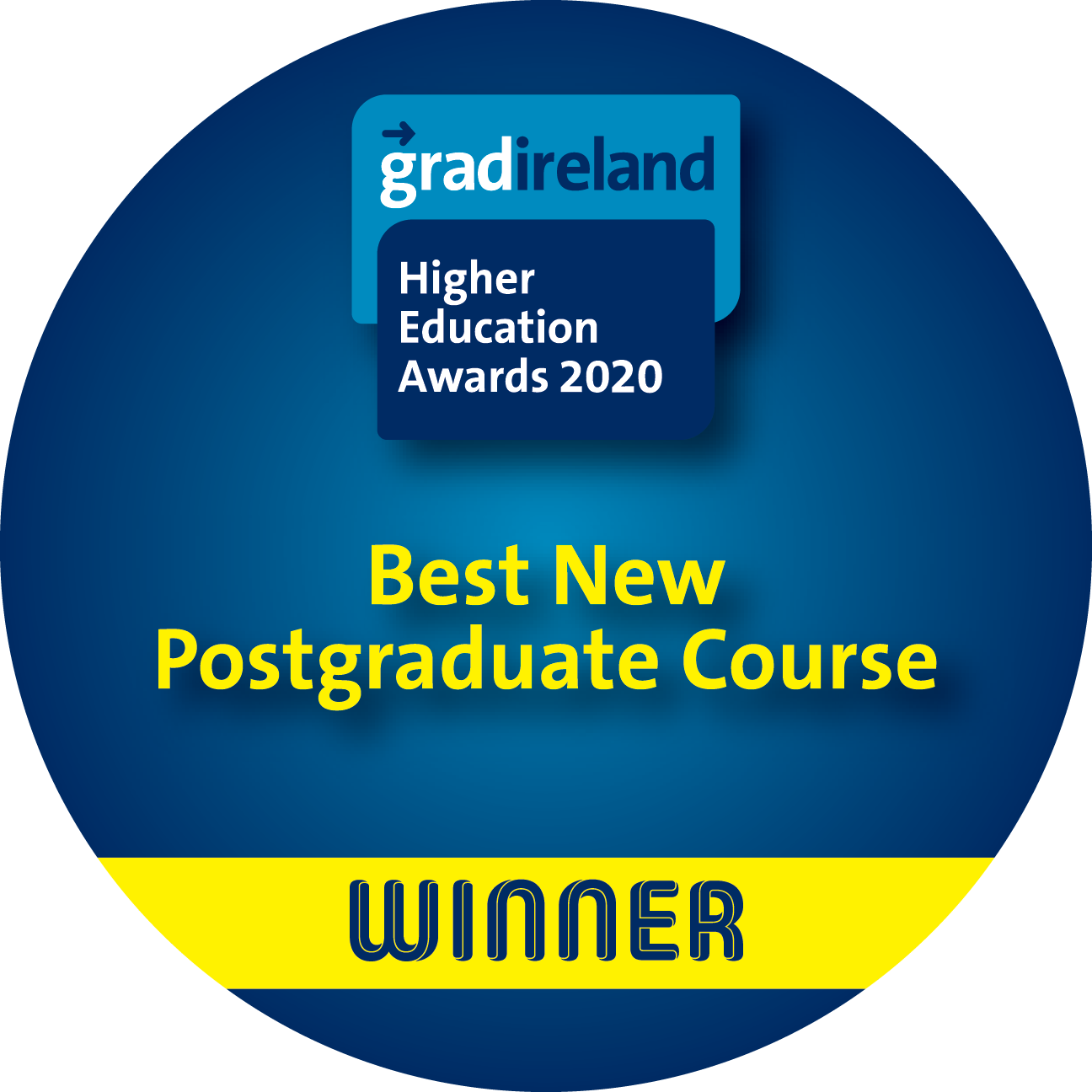-
Courses

Courses
Choosing a course is one of the most important decisions you'll ever make! View our courses and see what our students and lecturers have to say about the courses you are interested in at the links below.
-
University Life

University Life
Each year more than 4,000 choose University of Galway as their University of choice. Find out what life at University of Galway is all about here.
-
About University of Galway

About University of Galway
Since 1845, University of Galway has been sharing the highest quality teaching and research with Ireland and the world. Find out what makes our University so special – from our distinguished history to the latest news and campus developments.
-
Colleges & Schools

Colleges & Schools
University of Galway has earned international recognition as a research-led university with a commitment to top quality teaching across a range of key areas of expertise.
-
Research & Innovation

Research & Innovation
University of Galway’s vibrant research community take on some of the most pressing challenges of our times.
-
Business & Industry

Guiding Breakthrough Research at University of Galway
We explore and facilitate commercial opportunities for the research community at University of Galway, as well as facilitating industry partnership.
-
Alumni & Friends

Alumni & Friends
There are 128,000 University of Galway alumni worldwide. Stay connected to your alumni community! Join our social networks and update your details online.
-
Community Engagement

Community Engagement
At University of Galway, we believe that the best learning takes place when you apply what you learn in a real world context. That's why many of our courses include work placements or community projects.
Cellular Manufacturing and Therapy (MSc)
Course Overview
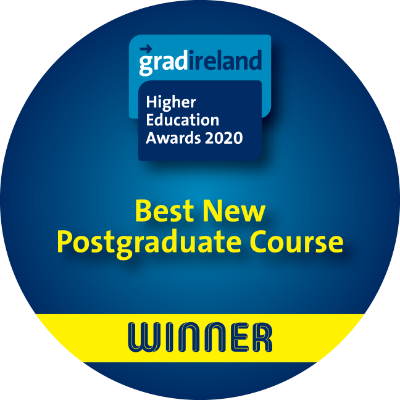
Winner of the Best New Postgraduate Course 2020 award in the GradIreland Higher Education Awards. To read more about this accolade, click here.
Why choose this programme?
“Cell and gene therapy comprise an extraordinary range of technologies that are already having an impact on patients and society and, in many ways, represent the future of medicine. However, these products present many challenges in terms of advanced manufacturing strategies, aseptic processing, automation and product characterisation. This MSc course provides the skills needed to address these challenges"—Professor Frank Barry, Scientific Director of the Regenerative Medicine Institute
Cell and gene therapy was identified as the most exciting therapeutic innovation by 79% of the 151 international biopharmaceutical manufacturers surveyed by the NIBRT, the Irish National Institute for Bioprocessing Research and Training (Trends in Manufacturing Report). The same organizations have difficulty filling available positions, specifically citing the need to hire bioprocess engineers and automation engineers.
The primary objectives of the MSc in Cellular Manufacturing & Therapy at the National University of Ireland Galway is to A) provide formal training in cellular bioprocessing for clinical application and B) cultivating a rigorous scientific underpinning for the development of a cellular therapy. The course curriculum balances the scientific aspects of cellular therapy (in 3 modules), bioprocessing and manufacturing regulation (in 2 modules) and offers optional modules in cancer biology, business, clinical trials and bio-ethics. A student’s practical skills are developed beyond the classroom laboratory activities with supplemental activities such as workshops in sterile gowning and a 4-month work or laboratory placement, thereby gaining research or enterprise-centric skills. When launching, this MSc programme was the first of its kind worldwide.
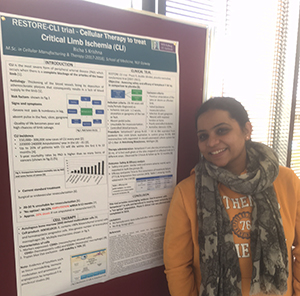
Richa Krishna, MSc student, Cellular Manufacturing & Therapy, pictured at Poster Day.
Unique position
The MSc in Cellular Manufacturing and Therapy is the one and only course in Ireland offering the following opportunities in support of a career in cellular therapy:
- Instruction in the clinical-grade manufacturing of therapeutic cells for clinical application.
- Modules in the biology underpinning the therapeutic application of mesenchymal stromal cells, immunotherapy and induced pluripotent stem cells, three types of cellular therapy currently in translation for clinical application.
- Instruction by a multidisciplinary team of experts, the first to translate cellular therapies from the bench to clinical application in Ireland.
- Four-month work placements where student are embedded in a host environment corresponding to their carer of choice.
New skills
Through the course activities, students will have the opportunity to develop both technical and transferrable skills. Technical skills will be acquired through practical activities and module assessments, including aseptic technique in mammalian cell culture; cryopreserving and thawing cryopreserved cells; plating and expanding adherent and mammalian cells; quantifying cell number, viability, density; pipetting large and small volumes; sterile gowning; data collection, presentation and analysis and technical writing. Transferable skills will be developed through course workshops and group activities, including the ability to meet deadlines; adaptability and flexibility, analysis and decision making, critical thinking and evaluation of the literature, research/scientific integrity, team leadership, networking, organization, public speaking, time management and written communication.
What makes this course unique ...
- Modules in the biology underpinning the therapeutic application of mesenchymal stromal cells, immunotherapy and induced pluripotent stem cells, three types of cellular therapy currently in translation for clinical application.
- Instruction by a multidisciplinary team of experts, the first to translate cellular therapies from the bench to clinical application in Ireland.
- Four-month placement where student are embedded in a host environment corresponding to their carer of choice.
Allied University of Galway courses
-
MSc in Regenerative Medicine. Click here to learn more.
-
MSc in Microscopy and Imaging. Click here to learn more
Scholarships available
Find out about our Postgraduate Scholarships here.
Applications and Selections
Applications are made online via the University of Galway Postgraduate Applications System.
Who Teaches this Course
Collaborative delivery of course content
The MSc in Cellular Manufacturing & Therapy is delivered by experts in the field of cellular manufacturing and pre-clinical research supporting the development of new therapies; those directly responsible for pioneering cellular manufacturing and therapy in Ireland. As an example, the Centre for Cell Manufacturing Ireland (CCMI) team (Ireland’s first centre for cell manufacturing) are active instructors in the Cellular Manufacturing 1 and 2 modules where the learning activities are centred around bioprocessing and its regulatory and quality oversight. Professors O’Brien, Barry and Griffin, pioneering coordinators of the first cellular therapy clinical trials in Ireland, deliver an in-depth lecture series in the Mesenchymal Stem Cell Therapy module where they describe the pre-clinical and clinical aspects of developing cellular therapies.
Developing, producing and applying a cellular therapy clinically is a multidisciplinary challenge. We rely on collaboration with experts in each of these fields to contribute their knowledge and insight within this programme. Examples of these collaborative activities in the past include:
Industrial collaboration
- Project managers from Cell Medica UK host a CV and interview skills workshop
- Bioreactor workshop hosted by Terumo technicians provided training on novel equipment.
- Guest lecturing from Biostor Ireland on cell bank storage and worldwide distribution for scientific research and clinical application.
- Staff from ONK Therapeutics providing immunotherapy practical activities, upskilling students in non-adherent cell culture, characterization and cryopreservation.
- Dissertation placements hosted by Regeneron, Avectas, Intas Pharmaceuticals, Aerogen, Charles River, Stempeutics, Galway Blood and Tissue Establishment (GBTE), Centre for Cellular Manufacturing Ireland, etc.
Academic Collaboration
- Lecturing and workshops provided by the scientists within the Regenerative Medicine Institute specializing in discovering novel applications for cellular therapies and understanding their mechanism of action
- Lecturing and gowning activities by the Centre for Cell Manufacturing Ireland who produce cellular therapies for clinical application
- Guest lecturing visionaries in the field, such as Prof. Martin Leahy (Chair of Applied Physics at NUIG), emphasizing the advantages of multidisciplinary collaboration to investigate biologic queries
- Dissertation placements hosted by scientists and primary investigators including Dr. Roisin Dwyer (cellular therapy for breast cancer), Dr. Kasia Whysall (muscle-derived progenitor therapy), Dr. Daniel O’Toole (cellular therapy for acute repertory distress) or at Hebei Medical University in China by Dr. Jun Ma (cellular therapy for neural disorders)
Collaborations with Clinicians and Patients
- Lecturing and mentoring by scientist clinicians, the first in Ireland to translate cellular therapies to clinical trials
- Assessment of scientific poster presentations describing ongoing clinical trials by the clinical trial recruitment specialists at (Galway University Hospitals)
- Module coordination by Dr. Veronica McInerney (Cellular Therapy Clinical Trials Manager), offering a unique insight into initiating first in man clinical investigations
- Dissertation placements hosted by Cancer Trials Ireland (CTI), Prof. Timothy O’Brien (coordinator of two cellular therapy clinical trials) and Prof. O’Dwyer (coordinator of trials in multiple myeloma)
Requirements and Assessment
Key Facts
Entry Requirements
Students must have completed one of the following with a minimum of 2nd class honours (or equivalant):
1) An undergraduate degree in medicine, pharmacy, manufacturing, biology, engineering.
2) An equivalent biomedical science-related undergraduate degree.
Applicants from non-biomedical science related backgrounds will be considered on a case-by-case basis at the discretion of the coordinators.
Students who have a degree without Honours in a related area and have 3+ years of practical experience in the subject area will also be considered for this programme.
For applicants where English is a second language, we will adhere to University of Galway guidelines of requiring IELTS scores of 6.5, TOEFL scores of 88, and/or Pearson PTE scores of 61 with no less than 6.5 in any component.
Initially a shortlisting procedure will be applied to prioritise applicants. Those who do not meet the primary entry criteria as described above will be declined entry into the programme. The remaining applicants will be reviewed in closer detail. Significant weight will be placed on:
A) the applicant’s essay describing their motivation for applying for this course and their career aspirations following the successful completion of the MSc,
B) the applicant’s previous academic performance.
An interview may be conducted.
Additional Requirements
Recognition of Prior Learning (RPL)
Duration
MSc, full-time
Next start date
September 2024
A Level Grades ()
Average intake
15–18
QQI/FET FETAC Entry Routes
Closing Date
Please view the offer rounds website.
NFQ level
Mode of study
ECTS weighting
90/60/30
Award
MSc
CAO
Course code
MSC-CMT
Course Outline
Programme curriculum:
The Cellular Manufacturing & Therapy suite of programmes are available in a 1-year full time format that suit individuals completing their BSc or transitioning between careers. Courses are also available in a two-year part time format or in “microcredits” making it available to employed individuals hoping to upskill while continuing employment. The modules are available in a variety of formats giving accessibility to a wide range of students with different learning styles, including a lecture-based format, a flipped classroom format, in blended learning and fully online.
The Cellular Manufacturing & Therapy suite of courses are on offer as an MSc programme (90 ECTS), as a post-graduate diploma programme (60 ECTS) or as a post-graduate certificate programme (30 ECTS). Both the MSc and post-graduate diploma are available in a one-year full time capacity or 2-year part time capacity. To see the proposed core and optional modules available in each programme starting in the next academic yaer, please click here
Curriculum information
Curriculum information relates to the current academic year (in most cases). Course and module offerings and details may be subject to change.
Why Choose This Course?
Career Opportunities
Why choose this course?
Potential employers are seeking graduates of this course to fill gaps in their current staffing. To that end, students enrolled in the MSc programme will complete a 4-month long dissertation project that will enable them to develop technical and transferrable skills while networking within a successful organization. Historically, our students were placed in organizations such as the Centre for Cellular Manufacturing Ireland, Galway Blood and Tissue Establishment, Charles River, Stempeutics, Avectas, Cancer Trials Ireland, Regeneron, Intas Pharmaceuticals, Aerogen, Hebei Medical University, Alexion Pharmaceuticals, Hi-Tech Health and Valitacell.
Our graduates have successfully secured employment as plant technologists, production assistants, manufacturing biotech associates, cell culture scientists, cell culture technical support, in quality assurance and assay development or as research assistants. They are employed by world leading organizations such as Takeda, Autolus, University of Galway, Fuji Diosynth Biotechnologies, Avectas, Abace-Biology and Charles River laboratories.
Potential employers have the following comments regarding the Cellular Manufacturing and Therapy programme at University of Galway:
“The students from the MSc in Cellular Manufacturing and Therapy at University of Galway [have an] excellent understanding of cell culture, cryopreservation and aseptic techniques and ability to work independently. This allowed for the [placement] student to generate high quality data key for the next step of our research programme.”—Dr Kasia Whysall, Irish Research Council Laureate, University of Galway
“A student from the MSc in Cellular Manufacturing and Therapy at University of Galway has joined our team at AVECTAS with a deep understanding of both the practical and theory aspects of cellular therapies, as well as familiarity with issues pertaining to quality and GMP. This knowledge has led to rapid integration of the student into the team to the benefit of both the business and the student.”—Dr Shirley O’Dea, Chief Scientific Officer, Avectas
“ The MSc in Cellular Manufacturing and Therapy at University of Galway is a wonderful programme providing graduates with the professional skills they require for employment in the research, development, translation and manufacturing of novel advanced therapeutic products. In particular, this course provides the laboratory-based skills and training in the practical techniques required for GMP-manufacturing of cell products. It delivers a solid scientific rationale underpinning the development of cellular therapies, the very skills and knowledge that I require in future employees.”—Andrew Finnerty, General Manager, Centre for Cellular Manufacturing Ireland
“Students from the MSc in Cellular Manufacturing & Therapy arrive in their placements with a very acute work ethics and professionalism, eager to learn and very aware of the importance of a high standard aseptic technique, mind-sets that are pivotal when constructing cell banks.”—Dr Silvia Almeida, Virologist at Charles River
Who’s Suited to This Course
Learning Outcomes
Transferable Skills Employers Value
Work Placement
Study Abroad
Related Student Organisations
Course Fees
Fees: EU
Fees: Tuition
Fees: Student levy
Fees: Non EU
Find out More
Cynthia Coleman
E: cynthia.coleman@nuigalway.ie

Andrew Finnerty | General Manager, Centre for Cell Manufacturing Ireland
The MSc in Cellular Manufacturing and Therapy at NUI Galway is a wonderful programme providing graduates with the professional skills they require for employment in the research, development, translation and manufacturing of novel advanced therapeutic products. In particular, this course provides the laboratory-based skills and training in the practical techniques required for GMP-manufacturing of cell products. It delivers a solid scientific rationale underpinning the development of cellular therapies; the very skills and knowledge that I require in future employees.in Connect with Andrew
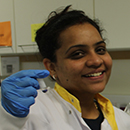
Richa Krishna | MSc student, Cellular Manufacturing & Therapy
Hailing from a clinical background and being aware of its current traditional therapy limitations, I opted for Cellular Manufacturing & Therapy to explore the future of advanced cell therapy. This field has a lot of potential due to current clinical trials and research advances. This course gave me an opportunity to gain knowledge of the state of the art of the cellular therapies transitioning into the health care systems around the globe. If this area interests you, NUIG would lend you a perfect platform from where you can shape your career in the research field or industry. Needless to add Galway is very friendly place for international students with support to help along your academic journey.
Rory Rafferty | MSc student, Cellular Manufacturing & Therapy
I chose this course because after spending 3 years working in the medical device industry I knew that I needed a chance in scenery. The reputation of NUIG as one of the colleges at the forefront of research, clinical trials, cellular manufacturing and GMP in the field of regenerative medicines naturally attracted me to the course. I felt that it was the perfect stepping stone that would allow me to greatly improve my CV. I feel the course has given me invaluable transferable skills. It has also given me a true insight into the workings of clinical research and Good Manufacturing Practices that I feel will allow me to leave my own lasting mark in the scientific world.in Connect with Rory
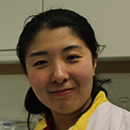
Ti Zhang | MSc student, Cellular Manufacturing & Therapy
A one-year taught master programme, Cellular Manufacturing & Therapy focuses on translating innovative biological therapies to clinical applications, especially in the stem cell area. This course has a close relationship with the Regenerative Medicine Institute scientists and Centre for Cellular Manufacturing Ireland staff. Participating in this course will significantly improve your academic performance and capability in the laboratory. Our extremely friendly lecturers will bring engaging classroom activities and the small class size includes students from different backgrounds, makes learning approachable.
James O'Brien | MSc student, Cellular Manufacturing & Therapy
During my Biotechnology undergraduate degree, I was generally most interested in the modern medical aspects, especially regenerative medicine, gene therapy and cell therapy. Unsurprisingly, when I heard that this new MSc. program was being set up, I immediately made inquiries, and found myself excited about applying. So far, this course has given me enormous insight into the scientific background of modern cellular therapies and has also provided practical industrial skills and knowledge. The course is well-structured, and the co-ordinators and lecturers have vast experience and excellent portfolios in the field. I feel my overall skillset has been specialized abundantly in just a short time by this course, and I feel like I will be more confident when applying for industrial jobs in the cellular therapy domain.








